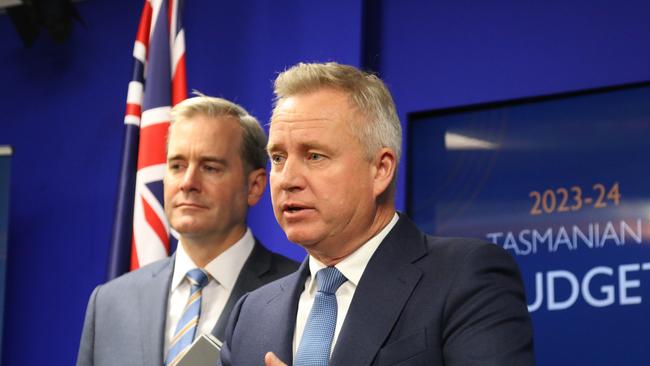Debt, deficit, but no new taxes in Tasmanian budget
Tasmania’s Liberal government will avoid raising taxes as it continues to spend big – and to deliver an AFL team and stadium.

Australia’s last Liberal government will more than double debt but avoid raising taxes as it continues to spend big on infrastructure, health improvements - and to deliver an AFL team and stadium.
Premier Jeremy Rockliff’s second budget, and first since his government slipped into minority, will see net state debt soar from $2.3b in 2022-23 to $5.6b in 2026-27.
Deficits of $217m in 2022-23 and $297m in 2023-24 will improve to wafer-thin surpluses - of $12.7m in 25-26, rising to $61m in 26-27.
There will be modest spending cuts – a “budget efficiency dividend” - of $300m over four years, but spending will continue to grow, albeit glacially at .06pc from 2023-24 to 2026-27.
Treasurer Michael Ferguson, selling the budget as “targeted, careful and considered”, defended the deep dive into red, which will see annual borrowing costs balloon from $86m to $285m by 2026-27.
“Tasmania will continue to have the lowest level of net debt in the nation,” he said. “We need to continue to support Tasmanians, unlock opportunities and provide a business environment that generates continued growth and security.”
Despite warning of “undoubtedly challenging economic headwinds”, Mr Ferguson has allocated $230m of a promised $375m for controversial plans to build an AFL stadium at Hobart’s Macquarie Point, as part of an “urban renewal precinct”.
As well, there is a further $34.5m for a new AFL team, $60m for a new AFL high performance training and administration centre, $65m to upgrade the existing York Park AFL stadium and $100m to remove sewerage works to facilitate the stadium.
The budget papers express Treasury concerns the AFL dream could involve even more, given that the stadium project is “yet to be fully defined” and may be subject to “supply constraints and cost escalations”.
Similarly, the sewerage works relocation cost is “likely to exceed original estimates”.
The big spending items, in a budget reliant on federal funds for 67pc of revenue, relate to an increased health spend ($12b over four years, including upgrades and new facilities for hospitals, ambulance and mental health centres) and a $5b infrastructure spend, focused on $2.2b for roads and bridges.
After stellar economic growth in 2021-22 of 4.3pc, interest rate increases, inflation and supply problems have applied a handbrake to the state’s economy.
Growth in gross state product fell to 1.5pc in 2022-23 and Treasury expects it to recover slowly, to 2pc in 23-24, 2.25pc in 24-25, and 2.5pc in the following two years.
Employment will decline and unemployment rise from 4pc in 2022-23 to 4.5pc from 23-24 onwards.
Treasury expects inflation to moderate – from 7.25pc in 2022-23, to 4.25pc in 23-24, declining further to 2.5pc in 2025-26.
State’s population will continue to grow slowly, at .7pc in 2022-23, rising to .9pc in 23-24, before declining again to .7pc from 25-26.
GST receipts are down almost $900m on previous projections from 2022-23 to 2025-26, but will still rise overall from $3.1b in 22-23 to $3.8b in 26-27.
These GST rivers of gold constitute 42pc of the state government’s revenue, but the budget papers identify key risks.
One is a current Commonwealth Grants Commission five-yearly review of the methodology of GST funds distribution.
Another is the expiry in 2027-28 of a “no worse off guarantee” that shields Tasmania from negative impacts of a 2018 revamp of distribution rules made to appease Western Australia.
Mr Ferguson called on the Albanese government to extend this guarantee, which over the budget years is worth $324m to the state.
Both premier and treasurer repeatedly contrasted their fiscal and economic position to this week’s high-tax, public servant-slashing Victorian budget.
“Victoria… have got huge debt, unsustainable debt, cutting 4,000 jobs throughout the public service, adding a new tax,” Mr Rockliff said.
“Tasmania has investment in key infrastructure and key services, but also has signalled very clearly to investors …that we are very competitive…Why wouldn’t you want to come to Tasmania?”




To join the conversation, please log in. Don't have an account? Register
Join the conversation, you are commenting as Logout